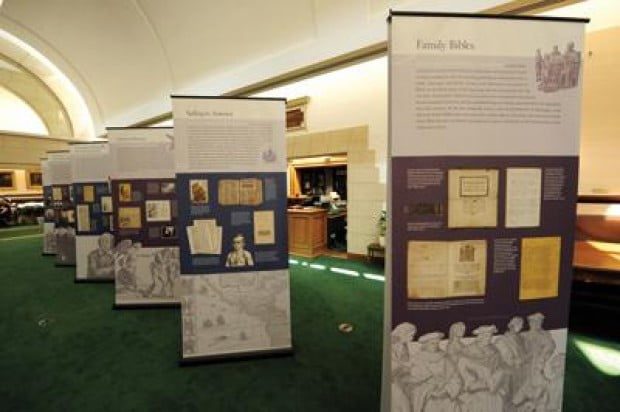
Pepperdine University’s Payson Library on Thursday debuts a new exhibit celebrating the 400th anniversary of the King James Bible.
By Ed Kamen / Special to The Malibu Times
After 400 years on the spiritual bestseller list, the King James Bible is celebrating its milestone anniversary with a traveling exhibition opening at Pepperdine University’s Payson Library this Thursday.
In honor of the first printing of the King James Bible in 1611, arguably the most significant work ever translated into English, the exhibit examines its fascinating and complex history in a presentation titled “Manifold Greatness: The Creation and Afterlife of the King James Bible.”
“We are delighted to have been selected as a site for this exhibition,” said Mark Roosa, dean of Pepperdine University Libraries. “This exhibition shows how important this book has been in history and helps audiences to develop a new understanding of its social, cultural, literary and religious influence over four centuries.”
The traveling exhibit consists of high-quality reproductions of rare and historic books, manuscripts and works of art, combined with interpretive text and related images.
“The exhibit deals with the King James Bible on several levels,” said Ken LaZebnik, director of public affairs for the Pepperdine Payson Library. “First, it explains how it came to be, through the origins of the translation. It also tells the story of the Bible as it has resonated throughout history and its influence on history.”
Translated over several years by six committees of England’s top scholars, the King James Bible became the most influential English translation of the Bible and one of the most widely read books in the world. Yet, only years before it was produced, the very idea of the Bible translated into English was considered dangerous and even criminal. But the translation flourished not just in Britain but in the English colonies as well, including those in America.
“Part of the exhibit is devoted to its significance in pioneer America,” said LaZebnik, “where it became a repository of family history.” The Bible became a place for many families to record births, deaths, marriages and other important events in their history.
The exhibit features information on the literary influence of the Bible in both the United Kingdom and the United States. Many authors have demonstrated the influence of the language and style of the King James Bible on their work: among them John Milton, William Blake, Walt Whitman and Emily Dickinson. In the Twentieth Century, many poets and novelists—from John Steinbeck in “The Grapes of Wrath” to Toni Morrison in “The Song of Solomon” — allude to the Bible in ways that enrich their narratives.
“Certainly in terms of the power and poetry of its language, there is nothing that matches it,” LaZebnik said. “It has had a powerful, lasting impact.”
Phrases from the King James Bible can be found in several of the famous speeches by Dr. Martin Luther King, Jr., and on Christmas Eve in 1968 millions of people around the world tuned in to hear astronaut Frank Borman read from the Bible while he sat in the first manned space capsule to orbit the moon.
Pepperdine University was one of approximately two dozen institutions specially selected to host the traveling exhibit through a grant from the National Endowment for the Humanities. It was organized by the Folger Shakespeare Library in Washington, D.C., and the American Library Association Public Programs Office.
Besides the panel exhibit, the library is also sponsoring free programs and other events for the public in connection with the exhibition. Five lectures will be presented through Sept. 20, starting with the opening lecture “John Milton and the King James Bible,” presented by Pepperdine Provost Dr. Darryl Tippens at 4 p.m. at the Payson.
“We feel very privileged to be one of the institutions to display the King James Bible exhibit,” said LaZebnik, “especially with the addition of the excellent speaker series. We are pleased and proud that a number of Pepperdine faculty members will be involved in that, as well.”
There will also be a film screening on Sept. 16, “KJB: The Book That Changed the World,” at the Elkins Auditorium. A discussion led by Craig Detweiler, director of the Center for Entertainment, Media and Culture, and associate professor of Communication at Pepperdine, will follow.
“The exhibition matches up so beautifully with Pepperdine,” said LaZebnik. “Pepperdine is a Christian institution with a great emphasis on Biblical scholarship. First and foremost, it’s about scholarship and investigation and the exploration of other faiths.”
